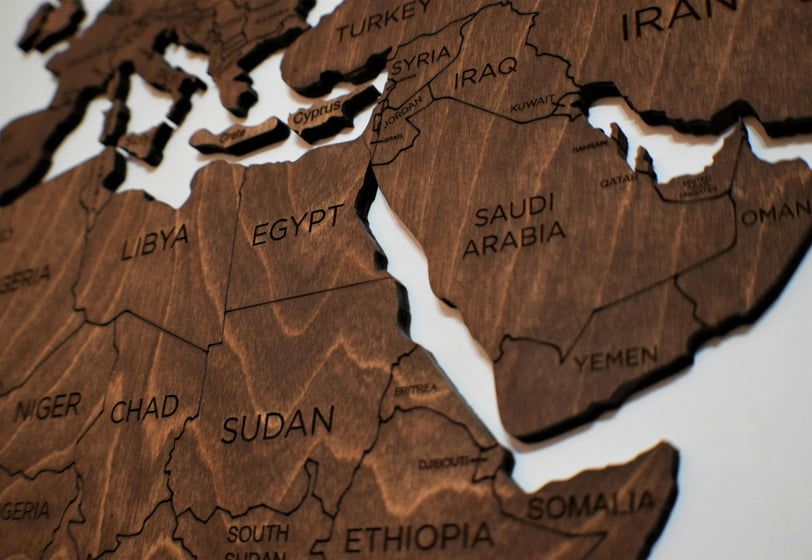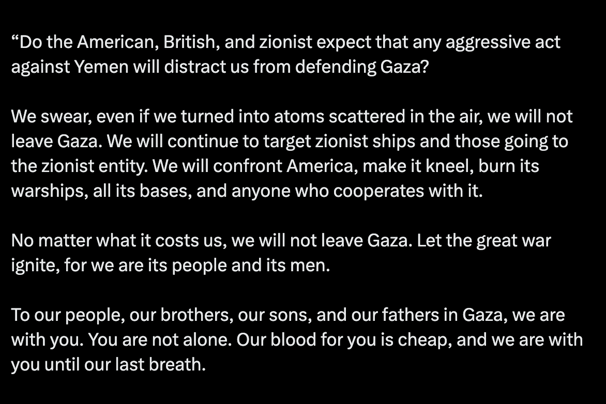Who Are The Houthis?
An outline of the Yemeni group and their current operations
THE DARK SIDE


Background
The Houthis, also known as Ansar Allah "Supporters of God", are a Yemeni rebel group that emerged in the early 1990s. They draw their name from the Houthi tribe who largely feature in the leadership of the predominantly Zaidi Shia Muslim group and have been involved in various conflicts in Yemen.
In recent years, they have gained significant attention for their role in the ongoing civil war in the country, and more recently, the targeting of shipping in the Gulf of Aden and the Red Sea.
The conflict in Yemen escalated in 2014 when the Houthis seized control of the capital, Sana'a, and other major cities. This triggered a military intervention by a coalition led by Saudi Arabia and backed by the United States.
The Houthis, who have been accused of receiving support from Iran, have been fighting, and winning against the internationally recognised government of President Abdrabbuh Mansur Hadi. They have also been engaged in fierce fighting with Isis and Al Qaeda militants in Yemen. This has been crucial in preventing these extremist organisations from gaining a stronghold in the country.
Despite Western support for the Saudi coalition and fighting against multiple factions, the Houthis have managed to take control of most of the populated areas in Yemen, including the capital city of Sana'a.
In addition to their ongoing fight against extremist groups, the Houthis have also been involved in targeting ships in the region due to taking an anti-Israeli position regarding the current ground war and bombardment of Gaza. In December 2023, the Houthi leadership made the following statement:
The Significance of their Actions
The Indian Ocean and Mediterranean Sea are linked by the Suez Canal, but to pass through, ships must first negotiate the Gulf of Aden and Red Sea which puts them within striking distance of Houthi anti-ship missiles.
Some 15% of global shipping normally passes through the area, roughly 50 container ships per day, although since the attacks started, many major shipping companies have stopped using the route and are forced to make the significantly longer journey around Africa.
The first notable incident was on November 19, when an armed group of Houthis, seized the Galaxy Leader, a British-owned and Japanese-operated vehicle carrier. Body-cam footage released by the Houthis showed them dramatically boarding the ship by helicopter and taking control from the crew at gunpoint. The Houthis then steered the ship, along with the crew, to al-Salif Port in Hodeidah, which is under their control, on Yemen’s western coast. The crew were later released unharmed.
The next attack making international news was on February 18th, when the MV Rubymar, a tanker, carrying thousands of tons of fertiliser was struck by several anti-ship missiles. All crew were evacuated at the time. The Houthis claimed responsibility for the attack, stating that it was in response to Israel's assault on Gaza, and the denial of essential goods and humanitarian aid. After steadily taking on water for two weeks, the Rubymar finally sank beneath the waves off the western coast of Yemen on March 2nd.
Another cargo ship was struck by missiles on March 6th. This time, three crew members were killed in a Houthi strike on the Barbados-flagged True Confidence, the first deaths caused by the group's attacks on merchant vessels. The remaining crew abandoned ship and were rescued by the Indian Navy. The ship currently remains adrift.
The targeting of ships by the Houthis is seen as a strategic move to put pressure on the coalition forces and draw attention to the humanitarian crisis in Gaza.
These actions have been condemned by the international community, as they violate international maritime laws and pose a threat to the safety of commercial shipping in the region. The Houthis have apparently garnered some international support from those who perceive their actions against shipping to be justifiable.
Throughout the current period, the Houthis have launched missile and drone attacks against US and UK naval ships in the region although these have been largely countered by on-board defence systems. In response, both the US and UK governments have condemned Iran for apparent ongoing support of the rebel group, and have launched overnight bombing missions targeting Houthi positions in Western Yemen.
In defiance to the air strikes, Houthi leader Abdul Malik al-Houthi said in a televised speech that the group will "seek to escalate more and more if the barbaric and brutal aggression against Gaza does not stop, along with the siege of the Palestinian people from whom they deny aid and medicine".
The conflict continues.
Addendum
In April 2024, it was reported that the US had proposed to remove the Houthis from their internationally designated list of terrorist groups, in exchange for the group ceasing all attacks on Red Sea shipping.
The Houthis refused.
Houthis:1
Western Forces: 0


